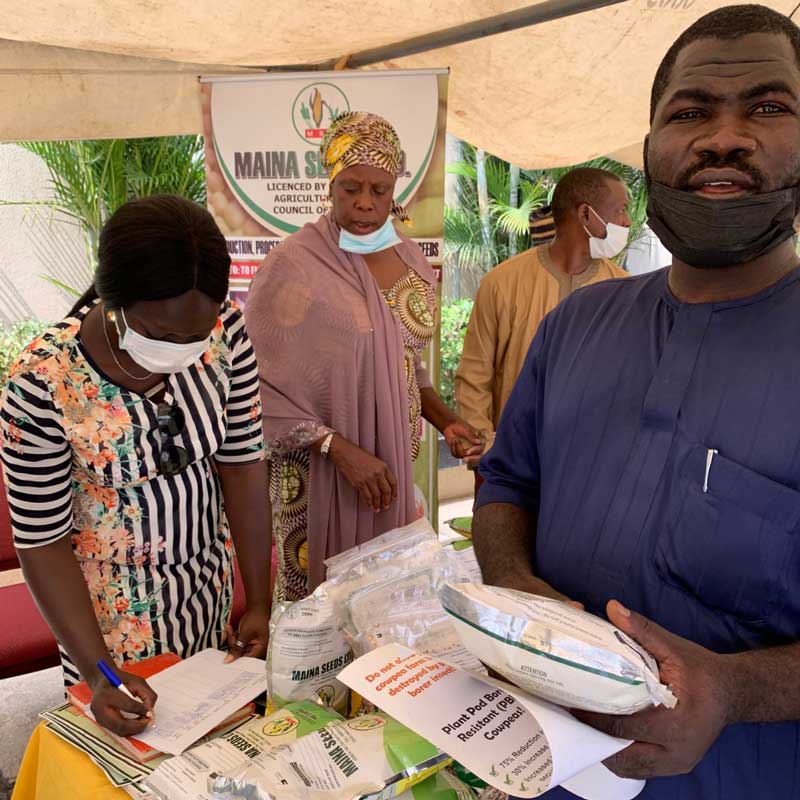Danforth Center and international partners unveil landmark insect resistant cowpea for Nigerian farmers
The first public sector biotech food crop released in Africa
ST. LOUIS, MO, July 14, 2021-- Nigeria has achieved a major milestone in the history of agricultural research and development with the commercial launch of Pod Borer Resistant (PBR) Cowpea. Officially called SAMPEA 20-T in Nigeria, PBR Cowpea is resistant to the pest, Maruca vitrata, the insect that is responsible for up to 80 percent of annual cowpea yield losses. About eight million Nigerian farmers and their families will benefit directly from cultivating the newly launched pod borer resistant cowpea variety.
PBR Cowpea, the first public sector biotech food crop released in Africa is the product of an international partnership under the coordination of the African Agricultural Technology Foundation (AATF) that included scientists from the Institute for Agricultural Research (IAR) of Ahmadu Bello University, Zaria.
At a well- attended event held on June 29 in Kano, Northwestern Nigeria, Kano State Governor, Dr. Abdullahi Umar Ganduje said, “Today, Nigeria is recognized as the first country in the world to release a cowpea variety that is resistant to Maruca, the destructive insect that had been a nightmare to farmers on the African continent. This is a landmark event that will help Nigeria achieve food security and increase farmers income.”
Dr. Donald MacKenzie, executive director of the Institute for International Crop Improvement at the Donald Danforth Plant Science Center led the regulatory submission process. “PBR Cowpea’s success is the result of bringing together some essential ingredients: farmer demand to solve a major production problem; a tested and accessible technology solution; an enabling policy environment; and the right partners,’’ MacKenzie said. “For those of us involved in technology development and plant breeding, finally being able to see that innovation in the seed bag, ready for delivery to farmers, is the ultimate reward.”

One of the first sales of PBR Cowpea taking place in Kano, Nigeria, at the commercial launch of SAMPEA 20-T cowpea.
On-farm demonstration trials were conducted during the 2020 growing season in 28 sites across Adamawa, Bauchi, Kaduna, Kano, Katsina, Zamfara, Kebbi, and Plateau states. “The development of PBR Cowpea has been a long journey which started in real terms with the acquisition of the technology,” said AATF’s Executive Director, Dr. Denis Kyetere. “PBR Cowpea will greatly benefit farmers and consumers in Nigeria and national cowpea production will increase by 20-100% as has been recorded and witnessed by farmers during the national performance trials. In addition, the need for massive importation of cowpea will be reduced.”
It is estimated that 20 percent of the cowpea currently consumed in Nigeria is imported. The adoption of PBR Cowpea will improve smallholder farmers' livelihoods by decreasing the costs of inputs (reduced pesticide applications and costs) and increasing yields (average increase about 20%, but much higher under high pest pressure) and thus income.
Dr. Faith B. Tarr, general development officer, biotechnology specialist, USAID Bureau for Resilience and Food Security Center for Agriculture-Led Growth said that the commercialization of pod borer resistant cowpea represents tremendous progress in applying innovative approaches to advance Nigerian food security.
“This achievement advances Nigeria’s capacity to harness science, technology and innovation to sustainably improve livelihoods and nutrition,” Faith said. “It also demonstrates that research investments can support innovation systems to deliver a pipeline of new tools and approaches that improve agriculture, food security, and resilience in the face of complex, dynamic challenges that Nigeria may face in the future.”
Partners who played a role in the development of SAMPEA 20-T include the United States Agency for International Development (USAID), Donald Danforth Plant Science Center, USA, CSIRO, Australia, Program for Biosafety Systems, Network for Genetic Improvement of Cowpea in Africa, IITA, Kirkhouse Trust, ARCN Nigeria, NABDA, and National Research Organizations in Nigeria, Ghana and Burkina Faso.
About the Donald Danforth Plant Science Center
Founded in 1998, the Donald Danforth Plant Science Center is a not-for-profit research institute with a mission to improve the human condition through plant science. Research, education and outreach aim to have impact at the nexus of food security and the environment, and position the St. Louis region as a world center for plant science. The Center’s work is funded through competitive grants from many sources, including the U.S. Agency for International Development, National Institutes of Health, U.S. Department of Energy, National Science Foundation, and the Bill & Melinda Gates Foundation. Follow us on Twitter at @DanforthCenter.
About AATF:
Founded in 2003 to address Africa’s food security prospects through agricultural technology, AATF believes that the agricultural sector is a key foundational pillar as Africa consolidates its economic growth and carves out its new position as a major global economic powerhouse and the next growth market in the world. It was formed in response to the need for an effective mechanism that would facilitate and support negotiation for technology access and delivery and formation of appropriate partnerships to manage the development & deployment of innovative technologies for use by smallholder farmers in SSA. (www.aatf-africa.org)
For more information contact: Karla Roeber, kroeber@danforthcenter.org, +1 314.406.4287